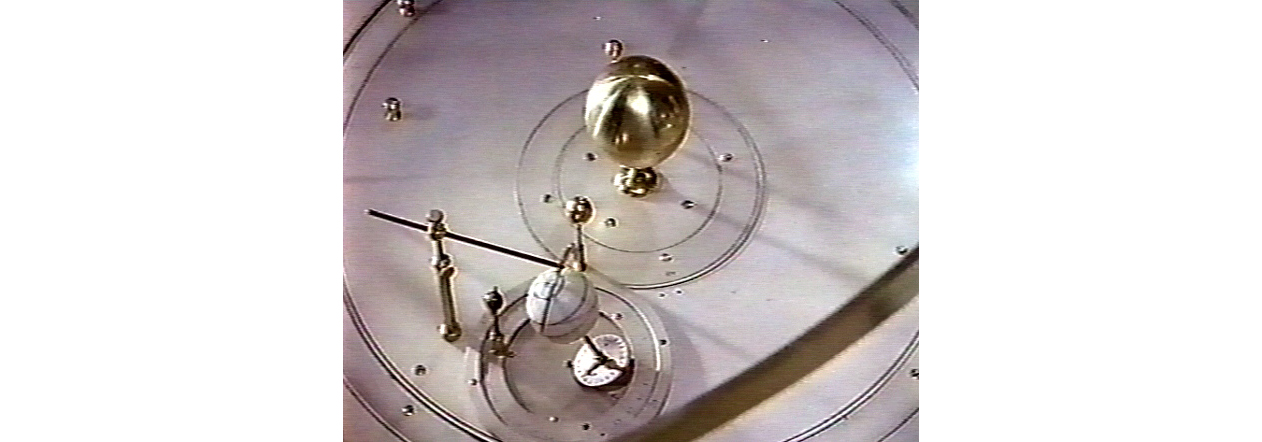The theory of what Stephen Jay Gould has called morphospace is that space of possible morphologies for species organized according to certain principles. Proponents of robust morphogentic processes, such as Stuart Kaufman or Richard Goodwin, see these processes as having large basins of attraction in morphospace.
Read Moretechno-science
non-linearity
In dynamical terms, such as in the study of chaos, a non-linear situtation is one where the result is not proportional to the cause. For instance "the straw that broke the camel's back" (eg. the elastic/plastic limit in building structures) introduces non-linearity. Up until that point, deformation had been proportional to load. Suddenly it loses all proportionality.
Read Moreorrery

An Orrery is a clocklike object which models the movements of the solar system. The orrery is often referred to as the paradigmatic embodiment of the Newtonian "clockwork"universe. Note that the orrery, like Newtonian time, could conceivably rotate in either direction. What was the origin of "clockwise" motion? Should we see it as one of those bifurcations that could equally have gone either way? Newton believed that from time to time the Creator had to interfere in the course of material processes in order to secure the normal progress against disturbances. Leibniz mocked this idea by asking him whether God had produced an imperfect mechanism.
Read MoreParadigm
The concept of scientific paradigms was given currency by Thomas Kuhn in The Structure of Scientific Revolutions. (1962) Kuhn's concept of paradigm applies both to a body of ideas, theories, etc. -- a "worldview"-- and to the social organization of science in which it appears. There are two aspects to scientific paradigms. Paradigms are shared constellations of belief (a disciplinary matrix) and they are also models or examples.
Read Morepath dependency
Ralph Waldo Emerson believed that the world would beat a path to the door of the maker of the better mousetrap, yet this is often not the case. Familiarity and custom make the accepted mousetrap seem "good enough," particularly if an effort is required to learn to use the new one. Group use accentuates individual acceptance. (cf. Rupert Sheldrakes concept of morphic fields)
Read Morephase boundary
A phase boundary separates different areas of phase space, for example the region of ordered dynamics from the region of chaotic dynamics. The region at or near this boundary is described as the complex area or regime.
printing
As Elizabeth Eisenstein points out in her study of Printing as an Agent of Social Change , the effect of printing on culture is generally ignored or considered to be so broad and self-evident that it is rarely studied, except by authors such as Marshall Macluhan, who she considers irresponsible. (see electronic media)
Read MoreProsthesis

"Prosthetics: The castration complex raised to the level of an art form." J. G Ballard. "Nothing is more disembodied than Cyberspace. It is like having your everything amputated." --John Perry Barlow (former lyricist for the Grateful Dead, "electronic frontier" advocate, and major supporter of the Republican party)
The medical prosthesis was developed to replace amputated limbs (for which war is the great experiment and driving force) As Mark Wigley points out, "Prosthetic technology alternated between producing substitutes for the body parts that military weapons had destroyed and producing these very weapons." (p. 23) see Ambroise Paré , "A Supplement to the Defects in Man's Body" in Collected Works, Paris, 1579.
Read Morequalitative/quantitative
...the qualitative is expressed in our concepts of reality and value. The Aristotelian universe was one in which qualities were primary. They were ontologically primary and indestructible. Qualities constituted an individual material body or substance when imposed on some portion of omnipresent neutral matter. (this is the hylomorphic model -- see form / matter. ) Aristotle sought to describe change-of-quality in general -- including both the fall of a stone and the growth of a child to adulthood.
Read Morerailway
"If there had been no railway to conquer distances, my child would never have left his native town and I should need no telephone to hear his voice; if travelling accross the ocean by ship had not been introduced, my Friend would not have embarked on his sea-voyage and I should not need a cable to relieve my anxiety about him." (S. Freud, Civilization and its Discontents, p.35) Freud's family moved several times when he was a small child. As a result, he had a phobia of traveling by train which never altogether left him.
Read Morereal time
The ironic nature of this concept is that real time is human subjective time. When we do not notice lags in communication, calculation, etc., we currently use the expression "in real time". But the reality of this time is simply a function of our motor habits, of the brief but real lags in our sensory systems, in our perceptions and neural activity.
Read Morescience
"Science is any attempt to bring facts into logical order". B. Bavink (see explain / describe )
"Science is concerned with the formal correlation of properties, and with the development of theoretical constructs that most parsimoniously and usefully describe all known aspects of that correlation, without exception." (Edelman, p.138)
science / philosophy
For Ernst Cassirer, the tensions which emerged in the late nineteenth century between philosophy and science were between philosophy's "special task" to "oppose the intellectual division of labor" and the increasing difficulty of that task as a result of the constant increase in the specialization of the sciences. (see The Problem of Knowledge, Introduction)
Whitehead describes science as anti-rationalist (eg. medieval) and based on a naive faith in the relation between brute facts and general principles. Thus it has never cared to justify its faith or explain its meanings and has remained blandly indifferent to its refutation by Hume. For Whitehead in 1925, the stable foundations of physics had broken up and it was time for science to become philosophical and examine its own foundations -- specifically "scientific materialism."
In Order Out of Chaos, Prigogine and Stengers see the origins of modern science in a "resonance" or convergence between theological discourse and theoretical and experimental activity. (p.46) leading to the "mechanized" nature of modern science, that debases nature and glorifies God and man. Subsequently, triumphant classical science could say of God's place in the world system "Je n'ai pas besoin de cette hypothèse." (Laplace to Napoléon)
In What is Philosophy? Deleuze and Guattari characterize some of the differences between science and philosophy. For them, philosophy is "the art of forming, inventing, and fabricating concepts" (p.2), while the object of science is "not concepts but rather functions that are presented as propositions in discursive systems". (p.117) "Philosophy proceeds with a plane of immanence or consistency; science with a plane of reference."
Read Morescientific space
"I do not believe that there exists anything in external bodies for exciting tastes, smells, and sounds, etc. except size, shape, quantity, and motion." (Galileo Galilei, On Motion, p.48) When Galileo proposed his doctrine of subject and object and the distinction between primary and secondary qualities, he established the scientific prejudgement that the concept of space is of something geometrical and not differentiated qualitatively.
Newtonian "absolute space" was based on a realist conception of mathematics (see Jammer p. 95) To Newton, mathematics, particularly geometry, is not a purely hypothetical system of propositions...instead geometry is nothing but a special branch of mechanics. Newton's first law of motion, which links change in motion with force requires an absolute (or inertial?) framework. It requires a distinction between absolute motion and relative motion and links force to a change in absolute motion. For example, as the train pulls away from the station, the station may appear to be moving and it can be said that the station is in relative motion to the train, but the force is acting upon the train, and it is the train that is accelerating absolutely. Newton tried to establish an absolute frame of reference for the universe defined in relation to its center of gravity. (not necessarily identical with the sun) Absolute spatial movement and position could then be measured in relation to that point.
But is geometry an empirical or ideal activity? For Cassirer, the most radical removal of geometry from experience had already occurred with Euclid, which was already based on figures that are removed from all possibility of experiment. Not only the idealizations of point, line, and plane, but the idea of similar triangles, whose differences are considered inconsequential or fortuitous, and that become identified as "the same" mark an immense step away form ordinary perception.
Read Moreself-organization

Self-organizing systems aquire new structure without specific interference from the outside. They exhibit qualitative macroscopic changes such as bifurcations or phase transitions. Stuart Kaufman calls this " Order for Free."Self-organization is the capacity of a field to generate patterns spontaneously, without any specific instructions. What exists in the field is a set of relationships among the components of the system such that the dynamically stable state into which it goes naturally -- what mathematicians call the generic (typical)) state of the system has spatial and temporal patterns. Fields of this type are now called excitable media. (see for example Belousov-Zhabotinsky reaction.)
Read MoreSensitivity to Intial conditions
Sensitivity to Initial Conditions: An extremely small change in the initial conditions of a chaotic or non-linear system leads to extremely differing results. Any arbitrarily small interval of initial values will be enlarged significantly by iteration. This is the so-called "butterfly effect" in which the flapping wings of a single butterfly could theoretically make the difference whether or not a hurricane occurred in another place and time. (The title of a paper by Edward N. Lorentz was "Can the flap of a butterfly's wing stir up a tornado in Texas?"
space
According to Sun Ra "Space is the place".
"The fascination which space seems to hold for philosophy is only equalled by the fascination which the idea of system holds for architects." (Christian Girard, Architecture et Concepts Nomades, p.72)
(cf. Roland Barthes' distinction between l'esprit de syst me and l'esprit syst matique .)
In this document, space is no longer considered unitary, as having a single essence, concept, or function. This is perhaps an indication of an outlook that is suspicious of the repressive ambition of a universal space which suppresses multiplicities, catastrophes, and incommensurabilities. One way to break with strategy is to fragment space. A typological approach to space in architecture, and a sensitivity to metaphor as crucial to theorization, indicate a move away from a singular concept of either space or theory.
The following taxonomy of spaces is a mixture of disciplinary divisions (art history, philosophy, etc.), technological divisions (writing, Cyberspace), territorial divisions (urban space), and subjective divisions (psycho-sexual, personal).
Read MoreSurveillance

Computer profiles generate objects for surveillance - they instruct or train the observer in what to watch and how to watch for it. Police, psychiatrists, educators, physicians, to name just a few groups, increasingly use profile technology for early or pre-identification of various traits within preselected populations - if you match enough elements of the profile, you could become atarget, even before any trait has manifested itself. To prepare the observer, to train the observer to see, and in the last instance, to be the observer's eyes, this is the imaginary of the simulation of surveillance.
Read Moresynergetics
"Synergetics is a mathematical-physical way of studying how collections of subsystems (such as atoms, cells, animals) can produce structures and patterns of self-organization.
tech metaphor
For Proust railway travel was like a metaphor in that "it united two distant individualities of the world, took us from one name to another name" (quoted in Kern Culture of Time and Space. p.217) " Gertrude Stein speculated that the Cubists' breakup of the old way of seeing things was suggested by aerial vision, even though none of them had been up in a plane.
While Proust used technological analogies to illustrate his method of metaphor, the Futurists used technological metaphors to illustrate their method of analogy, which they called "Imagination without wires"
cinema: close up and quick cut